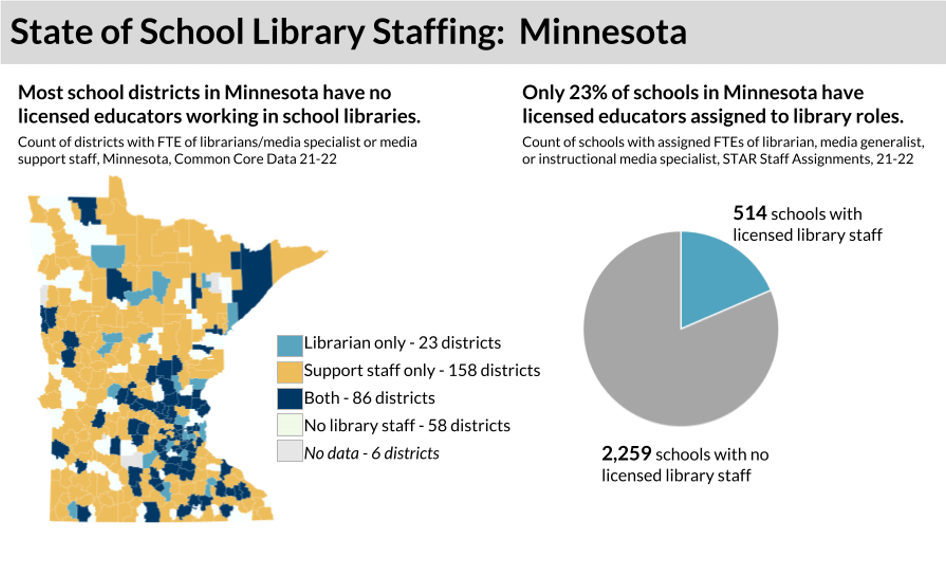Editor’s note: This article is submitted content from leaders of the Information & Technology Educators of Minnesota. All of the authors are Education Minnesota members.

In the 2021-22 school year, students at South Saint Paul Secondary School checked out 2,661 books between September and the last day of school in June. In the 2022-23 school year, students have checked out 5,583 books—more than double the previous year. A 109% increase in the number of books in students’ hands. What was the difference? Simple, for the first time in more than 10 years, a licensed library media specialist was in the media center matching kids with books, ordering new books catered to the students’ wants and needs, and working with teachers to teach lessons on digital citizenship, information literacy, research and more.
Now, picture the library media center at your current school building or district. What does it look like? Do you see students browsing stacks of books choosing their next read? Who is the person behind the checkout desk? Who is working with students? Chances are, it’s a media aide, paraprofessional or clerk. Because at most of the schools in Minnesota, there is no licensed library media specialist.
Without a licensed library media specialist in a school, no one is trained to curate a collection of books that are representative and engaging to the staff and students at the school. No one is able to “weed” or cull items from the collection that are out of date, or that shouldn’t be in a particular collection. Without a school librarian, no one is qualified to create makerspaces, places that encourage exploration, innovation and creativity in students.
According to the 2021-22 STAR Staff Assignments report, only 23% of Minnesota schools have a licensed library media specialist working in their school library. The Common Core data for the same year shows that the majority of school districts in our state don’t have any licensed library staff at all. Many districts’ school libraries are staffed by a media paraprofessional or clerk only, or run completely by volunteers if at all.
For both staff and students, these cold facts are disheartening. But there is hope, and even better, there is funding for that hope.
The recently approved 2023-25 Education Funding Omnibus bill includes two significant pieces on school library media centers. The first, (Sec. 6. [124D.901] PUBLIC SCHOOL LIBRARIES AND MEDIA CENTERS), states that “A school district or charter school library or school library media center provides equitable and free access to students, teachers, and administrators.” It also states that “A school library or school library media center must have the following characteristics: (5) is served by a licensed school library media specialist or licensed school librarian.”
Very simply put, this means that if a school claims to have a school library or media center, they must provide a qualified, licensed school library media specialist to manage the various aspects.
The second piece of the bill, [134.356] SCHOOL LIBRARY AID, states that “For fiscal year 2024 and later, school library aid for a district equals the greater of $16.11 times the district’s adjusted pupil units for the school year or $40,000. For fiscal year 2024 and later, school library aid for a charter school equals the greater of $16.11 times the charter school’s adjusted pupil units for the school year or $20,000.” It goes on to say, “School library aid must be reserved and used for directly funding the costs of the following purposes within a library:
(1) the salaries and benefits of a school library media specialist.” If your district, or better, your school already has a full-time licensed school library media specialist, there are other items for the library the money can be spent on.
So why is having a licensed library media specialist in your school library important?
Licensed school library media specialists are not only trained in areas of education that no other licensure areas cover, they are overwhelmingly trained at the master’s degree level and most have traditional classroom experience. Around the state, media paraprofessionals/clerks are being asked to do duties they are not trained nor paid adequately to do.
It is up to us, the teachers, to fight once again to provide our students with what they need, and that includes library media specialists. If you are in a school or district that does not currently have a licensed library media specialist serving your school’s library, make sure your administration is aware of the desire, the need and the funding to put one in place.
Written by: Laura Gingras, Library Media Specialist, Laketown Elementary, Waconia, ITEM President-Elect; Marie Hydukovich, District Media Specialist, South Saint Paul Public Schools; Janeen Perrizo, K-12 Media Specialist, St. Charles Public School, ITEM Co-President
The Information & Technology Educators of Minnesota (ITEM) is Minnesota’s professional organization for all school library media specialists, technology coordinators and specialists, technology integrationists, and anyone else interested in application of information and technology to learning.
Anyone interested in the objectives of ITEM is encouraged to become a member by joining MLA and choosing ITEM as your division. Visit www.mnlibraryassociation.org/page/JoinorRenew for more information.


